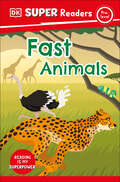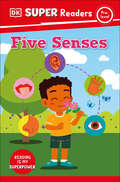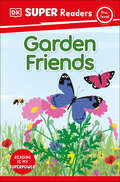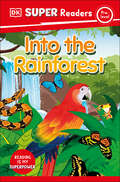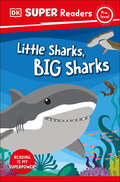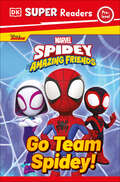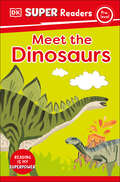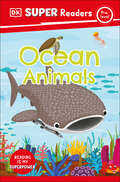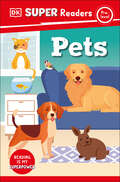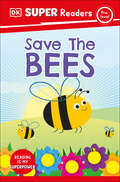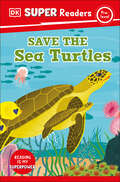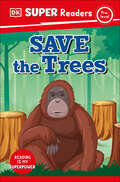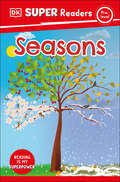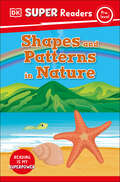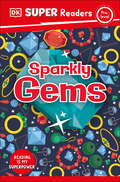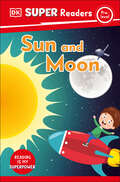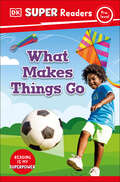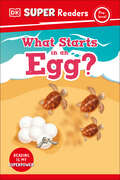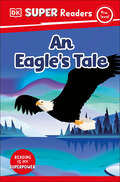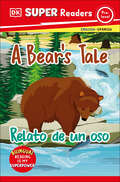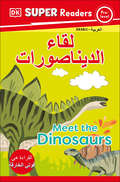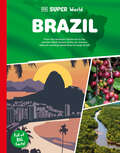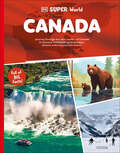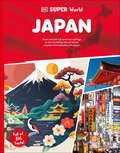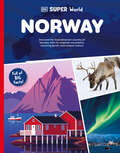- Table View
- List View
DK Super Readers Pre-Level Fast Animals (DK Super Readers)
by DKHelp your child power up their reading skills and learn all about the world&’s fastest animals with this fun-filled nonfiction reader carefully leveled to help children progress.DK Super Readers Pre-Level: Fast Animals will introduce kids to a parade of speedy animals—from the sprinting cheetah to a shrimp making a speedy catch of its dinner—and is a motivating introduction to using essential nonfiction reading skills, proving ideal for children ready to enter the riveting world of reading. DK Super Readers take children on a journey through the wonderful world of nonfiction: traveling back to the time of dinosaurs, learning more about animals, exploring natural wonders and more, all while developing vital nonfiction reading skills and progressing from first words to reading confidently. The DK Super Readers series can help your child practice reading by:- Covering engaging, motivating, curriculum-aligned topics.- Building knowledge while progressing key Grades Pre-K and K reading skills.- Developing subject vocabulary on topics such as animals, the world&’s fastest creatures, and the natural world.- Boosting understanding and retention through comprehension quizzes.Each title, which has been leveled using MetaMetrics®: The Lexile Framework for Reading, integrates science, geography, history, and nature topics so there&’s something for all children&’s interests. The books and online content perfectly supplement core literacy programs and are mapped to the Common Core Standards. Children will love powering up their nonfiction reading skills and becoming reading heroes. DK Super Readers Pre-level titles are visually engaging, full of fun facts, and introduce children to the wonderful world of nonfiction. Perfect to help children ages 3 to 5 (Grades Pre-K and K) who are ready to enter the world of reading.
DK Super Readers Pre-Level Five Senses (DK Super Readers)
by DKHelp your child power up their reading skills and learn all about the different human senses with this fun-filled nonfiction reader carefully leveled to help children progress.DK Super Readers Pre-Level: Five Senses will introduce kids to the five senses and how they help us to discover the world around us—including seeing, hearing, tasting, touching, and smelling—and is a motivating introduction to using essential nonfiction reading skills, proving ideal for children ready to enter the riveting world of reading. DK Super Readers take children on a journey through the wonderful world of nonfiction: traveling back to the time of dinosaurs, learning more about animals, exploring natural wonders and more, all while developing vital nonfiction reading skills and progressing from first words to reading confidently. The DK Super Readers series can help your child practice reading by:- Covering engaging, motivating, curriculum-aligned topics.- Building knowledge while progressing key Grades Pre-K and K reading skills.- Developing subject vocabulary on topics such as the five senses, the human body, and the world around us.- Boosting understanding and retention through comprehension quizzes.Each title, which has been leveled using MetaMetrics®: The Lexile Framework for Reading, integrates science, geography, history, and nature topics so there&’s something for all children&’s interests. The books and online content perfectly supplement core literacy programs and are mapped to the Common Core Standards. Children will love powering up their nonfiction reading skills and becoming reading heroes. DK Super Readers Pre-level titles are visually engaging, full of fun facts, and introduce children to the wonderful world of nonfiction. Perfect to help children ages 3 to 5 (Grades Pre-K and K) who are ready to enter the world of reading.
DK Super Readers Pre-Level Garden Friends (DK Super Readers)
by DKHelp your child power up their reading skills and learn all about creepy crawlies with this fun-filled nonfiction reader carefully leveled to help children progress.DK Super Readers Pre-Level: Garden Friends will introduce kids to a parade of tiny garden friends–including fun facts about how they live and where to find them–and is a motivating introduction to using essential nonfiction reading skills, proving ideal for children ready to enter the riveting world of reading. DK Super Readers take children on a journey through the wonderful world of nonfiction: traveling back to the time of dinosaurs, learning more about animals, exploring natural wonders and more, all while developing vital nonfiction reading skills and progressing from first words to reading confidently. The DK Super Readers series can help your child practice reading by:- Covering engaging, motivating, curriculum-aligned topics.- Building knowledge while progressing key Grades Pre-K and K reading skills.- Developing subject vocabulary on topics such as bugs, animals, and nature.- Boosting understanding and retention through comprehension quizzes.Each title, which has been leveled using MetaMetrics®: The Lexile Framework for Reading, integrates science, geography, history, and nature topics so there&’s something for all children&’s interests. The books and online content perfectly supplement core literacy programs and are mapped to the Common Core Standards. Children will love powering up their nonfiction reading skills and becoming reading heroes. DK Super Readers Pre-level titles are visually engaging, full of fun facts, and introduce children to the wonderful world of nonfiction. Perfect to help children ages 3 to 5 (Grades Pre-K and K) who are ready to enter the world of reading.
DK Super Readers Pre-Level Into the Rainforest (DK Super Readers)
by DKFind out what lives in the rainforest! Make reading your superpower with DK&’s beautiful, leveled nonfiction.Use your reading superpowers to learn all about the rainforest - a high-quality, fun, nonfiction reader - carefully leveled to help children progress.Into the Rainforest is a beautifully designed reader that will take you into this extraordinary habitat to discover what calls it home. The engaging text has been carefully leveled using so that children are set up to succeed. A motivating introduction to using essential nonfiction reading skills. Children will love to find out about the unique wildlife of the rainforest.
DK Super Readers Pre-Level Little Sharks Big Sharks (DK Super Readers)
by DKJoin the hunt for some weird and wonderful sharks! Make reading your superpower with DK&’s beautiful, leveled nonfiction.Use your reading superpowers to learn all about sharks, from the whale shark to one that glows in the dark - a high-quality, fun, nonfiction reader - carefully leveled to help children progress.Little Sharks, Big Sharks is a beautifully designed reader all about fourteen different sharks, and what makes each one unique. Think you know sharks? Read on! The engaging text has been carefully leveled using Lexile so that children are set up to succeed. A motivating introduction to using essential nonfiction reading skills. Children will love to find out about the different sharks in our oceans, and what makes each unique.
DK Super Readers Pre-Level Marvel Spidey and His Amazing Friends Go Team Spidey! (DK Super Readers)
by DKStart your reading adventure with Team Spidey in this fun-filled Pre-Level reader for 3-5 year olds, carefully leveled to help children progress in reading comprehension.Meet the members of Team Spidey and some of their amazing friends, including Iron Man, Ms. Marvel, and Black Panther. With engaging, simple text, little ones can enter the world of reading whilst learning about bravery and teamwork with all of their favorite characters from the hit TV show!Packed with amazing imagery, clear vocabulary, and a fun quiz, this pre-level DK Reader will help 3-5 year old Spidey and His Amazing Friends fans gain confidence at the beginning of their reading journey.The DK Super Readers series can help your child practice reading by:Covering engaging, motivating, curriculum-aligned topics.Building knowledge while preparing children to learn to read.Developing subject vocabulary on popular topics.Boosting understanding and retention through comprehension quizzes.Each title, which has been leveled using MetaMetrics®: The Lexile Framework for Reading, integrates science, geography, history, nature, and popular fiction topics, so there’s something for all children’s interests. DK Super Readers Pre-level titles are visually engaging and full of fun facts, perfect for children ages 3 to 5 (Pre-K and Kindergarten) who are ready to enter the world of reading.© 2025 MARVEL
DK Super Readers Pre-Level Meet the Dinosaurs (DK Super Readers)
by DKHelp your child power up their reading skills and learn all about dinosaurs with this fun-filled nonfiction reader carefully leveled to help children progress.DK Super Readers Pre-Level: Meet the Dinosaurs will introduce kids to a parade of different dinosaurs – allowing them to impress their friends with fun-to-say dinosaur names – and is a motivating introduction to using essential nonfiction reading skills, proving ideal for children ready to enter the riveting world of reading. DK Super Readers take children on a journey through the wonderful world of nonfiction: traveling back to the time of dinosaurs, learning more about animals, exploring natural wonders and more, all while developing vital nonfiction reading skills and progressing from first words to reading confidently. The DK Super Readers series can help your child practice reading by:- Covering engaging, motivating, curriculum-aligned topics.- Building knowledge while progressing key Grades Pre-K and K reading skills.- Developing subject vocabulary on topics such as dinosaurs and their features.- Boosting understanding and retention through comprehension quizzes.Each title, which has been leveled using MetaMetrics®: The Lexile Framework for Reading, integrates science, geography, history, and nature topics so there&’s something for all children&’s interests. The books and online content perfectly supplement core literacy programs and are mapped to the Common Core Standards. Children will love powering up their nonfiction reading skills and becoming reading heroes. DK Super Readers Pre-level titles are visually engaging, full of fun facts, and introduce children to the wonderful world of nonfiction. Perfect to help children ages 3 to 5 (Grades Pre-K and K) who are ready to enter the world of reading.
DK Super Readers Pre-Level Ocean Animals (DK Super Readers)
by DKJump in and meet some ocean animals! Make reading your superpower with DK&’s beautiful, leveled nonfiction.Use your reading superpowers to learn all about the creatures living in the oceans - a high-quality, fun, nonfiction reader - carefully leveled to help children progress.Ocean Animals is a beautifully designed reader all about life in the ocean - from the baby sea turtle to the killer whale, from seahorses to sharks. The engaging text has been carefully leveled using Lexile so that children are set up to succeed. A motivating introduction to using essential nonfiction reading skills. Children will love to find out about the extraordinary animals and fish in our oceans.
DK Super Readers Pre-Level Pets (DK Super Readers)
by DKWhat pet would you choose? Make reading your superpower with DK&’s beautiful, leveled nonfiction.Use your reading superpowers to learn all about pets, from dogs and cats to fish and crabs - a high-quality, fun, nonfiction reader - carefully leveled to help children progress. Pets is a beautifully designed reader all about all kinds of pets, from cute hamsters and tiny kittens, to singing birds and playful dogs.The engaging text has been carefully leveled using Lexiles so that children are set up to succeed. A motivating introduction to using essential nonfiction reading skills. Children will love to find out about all kinds of different pets.
DK Super Readers Pre-Level Save the Bees (DK Super Readers)
by DKWhat&’s the buzz about bees? Make reading your superpower with DK&’s beautiful, leveled nonfiction.Use your reading superpowers to learn all about bees and why we need them - a high-quality, fun, nonfiction reader - carefully leveled to help children progress.Save the Bees is a beautifully designed reader all about bees - how they pollinate plants and make honey, and how we should look after them. The engaging text has been carefully leveled using Lexile so that children are set up to succeed. A motivating introduction to using essential nonfiction reading skills. Children will love to find out about different bees, the essential work they do for our planet, and the ways we can protect them.
DK Super Readers Pre-Level Save the Sea Turtles (DK Super Readers)
by DKSea turtles big and small need your help! Make reading your superpower with DK&’s beautiful, leveled nonfiction.Use your reading superpowers to learn all about different kinds of sea turtles and how you can help to keep them safe - a high-quality, fun, nonfiction reader - carefully leveled to help children progress.Save the Sea Turtles is a beautifully designed reader all about different kinds of sea turtles, from the smallest to the biggest, and how we can all help to keep their marine environment clean and safe. The engaging text has been carefully leveled using Lexile so that children are set up to succeed. A motivating introduction to using essential nonfiction reading skills. Children will love to find out about tiny turtles and the biggest turtles and their lives at sea.
DK Super Readers Pre-Level Save the Trees (DK Super Readers)
by DKLook after our world and save the trees! Make reading your superpower with DK&’s beautiful, leveled nonfiction.Use your reading superpowers to learn all about why we need trees and how you can plant, grow and save them - a high-quality, fun, nonfiction reader - carefully leveled to help children progress.Save the Trees is a beautifully designed reader all about why we need trees - to keep our air clean, provide shade, food, and homes for animals - and how we can grow and protect trees. The engaging text has been carefully leveled using Lexile so that children are set up to succeed. A motivating introduction to using essential nonfiction reading skills. Children will love to find out about the different ways trees support our lives - and how we can protect theirs.
DK Super Readers Pre-Level Seasons (DK Super Readers)
by DKHelp your child power up their reading skills and learn all about the four seasons with this fun-filled nonfiction reader carefully leveled to help children progress.DK Super Readers Pre-Level: Seasons will introduce kids to each season in turn—including fun facts about the weather, the wildlife, and the activities within each—and is a motivating introduction to using essential nonfiction reading skills, proving ideal for children ready to enter the riveting world of reading. DK Super Readers take children on a journey through the wonderful world of nonfiction: traveling back to the time of dinosaurs, learning more about animals, exploring natural wonders and more, all while developing vital nonfiction reading skills and progressing from first words to reading confidently. The DK Super Readers series can help your child practice reading by:- Covering engaging, motivating, curriculum-aligned topics.- Building knowledge while progressing key Grades Pre-K and K reading skills.- Developing subject vocabulary on topics such as seasons, weather, and nature.- Boosting understanding and retention through comprehension quizzes.Each title, which has been leveled using MetaMetrics®: The Lexile Framework for Reading, integrates science, geography, history, and nature topics so there&’s something for all children&’s interests. The books and online content perfectly supplement core literacy programs and are mapped to the Common Core Standards. Children will love powering up their nonfiction reading skills and becoming reading heroes. DK Super Readers Pre-level titles are visually engaging, full of fun facts, and introduce children to the wonderful world of nonfiction. Perfect to help children ages 3 to 5 (Grades Pre-K and K) who are ready to enter the world of reading.
DK Super Readers Pre-Level Shapes and Patterns in Nature (DK Super Readers)
by DKShapes and patterns are everywhere! Make reading your superpower with DK&’s beautiful, leveled nonfiction.Use your reading superpowers to learn all about different shapes and patterns - a high-quality, fun, nonfiction reader - carefully leveled to help children progress. Shapes and Patterns in Nature is a beautifully designed reader all about looking carefully around you to find nature&’s incredible patterns and shapes. The engaging text has been carefully leveled using Lexiles so that children are set up to succeed. A motivating introduction to using essential nonfiction reading skills. Children will love to find out about zebras&’ stripes, arches in the sky and where to find spirals.
DK Super Readers Pre-Level Sparkly Gems (DK Super Readers)
by DKHelp your child power up their reading skills and learn all about beautiful gems with this fun-filled nonfiction reader carefully leveled to help children progress.DK Super Readers Pre-Level: Sparkly Gems will introduce kids to a parade of gems—including rubies, emeralds, pearls, and diamonds—and is a motivating introduction to using essential nonfiction reading skills, proving ideal for children ready to enter the riveting world of reading. DK Super Readers take children on a journey through the wonderful world of nonfiction: traveling back to the time of dinosaurs, learning more about animals, exploring natural wonders and more, all while developing vital nonfiction reading skills and progressing from first words to reading confidently. The DK Super Readers series can help your child practice reading by:- Covering engaging, motivating, curriculum-aligned topics.- Building knowledge while progressing key Grades Pre-K and K reading skills.- Developing subject vocabulary on topics such as gems, stones, and the natural world.- Boosting understanding and retention through comprehension quizzes.Each title, which has been leveled using MetaMetrics®: The Lexile Framework for Reading, integrates science, geography, history, and nature topics so there&’s something for all children&’s interests. The books and online content perfectly supplement core literacy programs and are mapped to the Common Core Standards. Children will love powering up their nonfiction reading skills and becoming reading heroes. DK Super Readers Pre-level titles are visually engaging, full of fun facts, and introduce children to the wonderful world of nonfiction. Perfect to help children ages 3 to 5 (Grades Pre-K and K) who are ready to enter the world of reading.
DK Super Readers Pre-Level Sun and Moon (DK Super Readers)
by DKWhat do you know about our Sun and Moon? Make reading your superpower with DK&’s beautiful, leveled nonfiction.Use your reading superpowers to learn all about the Sun and Moon - a high-quality, fun, nonfiction reader - carefully leveled to help children progress.Sun and Moon is a beautifully designed reader to inspire an interest in space.The engaging text has been carefully leveled using Lexile so that children are set up to succeed. A motivating introduction to using essential nonfiction reading skills. Children will love to find out about the Sun and the Moon they can see in the sky.
DK Super Readers Pre-Level What Makes Things Go? (DK Super Readers)
by DKPush, pull, pedal - make things go! Make reading your superpower with DK&’s beautiful, leveled nonfiction.Use your reading superpowers to learn all about the forces that move things - a high-quality, fun, nonfiction reader - carefully leveled to help children progress. What Makes Things Go? is a beautifully designed reader all about pushing, pulling, and pedaling, and using the forces of wind, water, and snow, all to make things go - and stop!The engaging text has been carefully leveled using Lexile so that children are set up to succeed. A motivating introduction to using essential nonfiction reading skills. Children will love to find out about how toys, bikes, scooters, and sledges use forces to go, and stop.
DK Super Readers Pre-Level What Starts in an Egg? (DK Super Readers)
by DKWhat starts in an egg? Prepare to be surprised! Make reading your superpower with DK&’s beautiful, leveled nonfiction.Use your reading superpowers to learn all about all kinds of eggs and the babies that call them home - a high-quality, fun, nonfiction reader - carefully leveled to help children progress. What Starts in an Egg? is a beautifully designed reader all about eggs - from tiny ladybug eggs to giant ostrich eggs, from the colorful to the camouflaged, and all sorts in between.The engaging text has been carefully leveled using Lexile so that children are set up to succeed. A motivating introduction to using essential nonfiction reading skills. Children will love to find out about what surprises eggs have in store for them!
DK Super Readers Pre-level An Eagle's Tale (DK Super Readers)
by DKHelp your child power up their reading skills and learn about eagles with this fun nonfiction reader—carefully leveled to help children progress.An Eagle’s Tale is a beautifully designed reader all about an eagle’s life and people’s beliefs about these majestic birds.The engaging text has been carefully leveled using Lexile so that children are set up to succeed.Children will learn all about eagles and the stories we tell about them.
DK Super Readers Pre-level Bilingual A Bear's Tale – Relato de un oso (DK Super Readers)
by DKUse your bilingual reading powers to learn all about traditional tales of bears with this fascinating nonfiction reader – carefully leveled to help children progress.A Bear’s Tale – Relato de un oso is a beautifully designed reader describing a year in the life of a bear and weaving in some traditional stories and beliefs about bears in America’s Pacific Northwest.The engaging text has been carefully leveled using Lexiles so that children are set up to succeed. A motivating introduction to using essential nonfiction reading skills in Spanish and English. Children will love to find out about bears and the stories that have long been told about them.
DK Super Readers Pre-level Meet the Dinosaurs (DK Super Readers)
by DKUse your reading superpowers to learn all about dinosaurs.Meet the Dinosaurs is a beautifully designed, high-quality nonfiction reader about everyone&’s favorite fascinating animals.The engaging text has been carefully translated into Modern Standard Arabic (MSA). Diacritics are used so children are set up to succeed.A motivating introduction to using essential nonfiction reading skills.Children will love to find out about the biggest, the noisiest, the fastest and the funniest dinosaurs, and impress their friends with fun-to-say dinosaur names.
DK Super World: Brazil (DK Super World)
by DKFrom the Amazon rainforest to the samba-filled streets of Rio de Janeiro, take an exciting adventure through Brazil.DK Super World: Brazil is part of the new DK Super World series for children aged 7-11 to explore the wonders of diverse cultures and landscapes across the globe.Captivating and curriculum-aligned, this book builds background knowledge and is the perfect support for learning about the countries of the world. Embark on an educational journey with this enriching Brazil country profile book, specifically tailored for elementary school pupils.This geography book for children offers:Curriculum-aligned and age-appropriate material that covers all the core teaching points.Bright images, engaging content, and interactive elements that helps encourage reluctant learners.Vocabulary-building content covering a variety of topics.Captivating and curriculum-aligned content, diagrams, and interactive elements provide an immersive learning experience while covering core information about the richness of our world, one country at a time.With vibrant visuals and age-appropriate content to make complex information accessible and engaging for young learners, Brazil is the ideal companion to any science learning. Transform learning into an adventure with DK Super World, bringing science to life on every page.
DK Super World: Canada (DK Super World)
by DKJourney through the vast country of Canada to discover breathtaking landscapes, diverse cultures and rich history.DK Super World: Canada is part of the new DK Super World series for children aged 7-11 to explore the wonders of diverse cultures and landscapes across the globe.Captivating and curriculum-aligned, this book builds background knowledge and is the perfect support for learning about the countries of the world. Embark on an educational journey with this enriching Canada country profile book, specifically tailored for elementary school pupils.This geography book for children offers:Curriculum-aligned and age-appropriate material that covers all the core teaching points.Bright images, engaging content, and interactive elements that helps encourage reluctant learners.Vocabulary-building content covering a variety of topics.Captivating and curriculum-aligned content, diagrams, and interactive elements provide an immersive learning experience while covering core information about the richness of our world, one country at a time.With vibrant visuals and age-appropriate content to make complex information accessible and engaging for young learners, Canada is the ideal companion to any science learning. Transform learning into an adventure with DK Super World, bringing science to life on every page.
DK Super World: Japan (DK Super World)
by DKFrom Mount Fuji and hot springs to the bustling city of Tokyo, explore the wonders of Japan.DK Super World: Japan is part of the new DK Super World series for children aged 7-11 to explore the wonders of diverse cultures and landscapes across the globe.Captivating and curriculum-aligned, this book builds background knowledge and is the perfect support for learning about the countries of the world. Embark on an educational journey with this enriching Japan country profile book, specifically tailored for elementary school pupils.This geography book for children offers:Curriculum-aligned and age-appropriate material that covers all the core teaching points.Bright images, engaging content, and interactive elements that helps encourage reluctant learners.Vocabulary-building content covering a wide range of topics.Captivating and curriculum-aligned content, diagrams, and interactive elements provide an immersive learning experience while covering core information about the richness of our world, one country at a time.With vibrant visuals and age-appropriate content to make complex information accessible and engaging for young learners, Japan is the ideal companion to any science learning. Transform learning into an adventure with DK Super World, bringing science to life on every page.
DK Super World: Norway (DK Super World)
by DKDiscover the Scandinavian country of Norway, with its majestic mountains, stunning fjords, and unique culture.DK Super World: Norway is part of the new DK Super World series for children aged 7-11 to explore the wonders of diverse cultures and landscapes across the globe.Captivating and curriculum-aligned, this book builds background knowledge and is the perfect support for learning about the countries of the world. Embark on an educational journey with this enriching Norway country profile book, specifically tailored for elementary school pupils.This learn-to-read book for children offers:Curriculum-aligned and age-appropriate material that covers all the core teaching points.Bright images, engaging content, and interactive elements that helps encourage reluctant learners.Vocabulary-building content covering a wide range of topics.Captivating and curriculum-aligned content, diagrams, and interactive elements provide an immersive learning experience while covering core information about the richness of our world, one country at a time.With vibrant visuals and age-appropriate content to make complex information accessible and engaging for young learners, Norway is the ideal companion to any science learning. Transform learning into an adventure with DK Super World, bringing science to life on every page.
